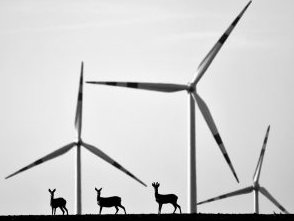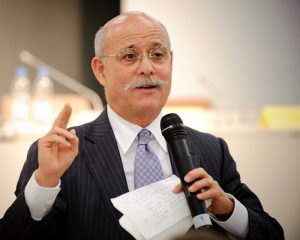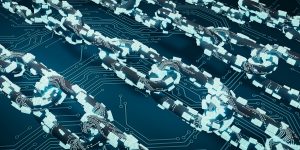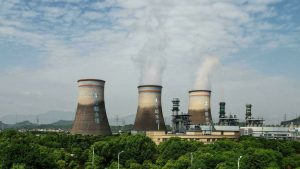Jeremy Rifkin is an American economist, author, lecturer, and activist. He investigates how scientific and technological innovations are affecting people and the environment.

Image source:
https://search.creativecommons.org/photos/12b564a4-e685-4c7e-afb4-470336484692 by European Environment Agency (EEA)
The World’s Fight for Sustainability

Image source:
https://search.creativecommons.org/photos/0ef26754-060c-4296-a522-e47ac57485fb
Born in 1945, in Denver, he grew up in Chicago. Rifkin graduated in economics from the Wharton School of Business at the University of Pennsylvania. Rifkin was one of the organizers of the March on the Pentagon and the next year established the Citizens Commission, to report U.S. war crimes during the Vietnam War. He constantly struggled against big oil companies and the biotechnology industry. Rifkin began holding lectures for senior management and later became an adviser to the EU on such topics as the economy, climate change, and security in the energy field. He helped to develop EU’s Third Industrial Revolution plan to achieve long-term economic sustainability.
The Third Industrial Revolution
The Second Industrial Revolution was powered by fossil fuels, but nowadays this leads us into a dangerous climate change. Throughout history, great economic revolutions have been followed by changes in communication and energy systems which make more expansive and integrated trade possible. Nowadays, according to Rifkin, a new revolution based on internet technology and renewable resources is coming: the Third Industrial Revolution (TIR).

Image source:
https://commons.wikimedia.org/wiki/File:Internet1.jpg
Hundreds of millions of people will produce their own green energy and share it in an “energy internet“, exactly like we share information online. This system will be connected to plug-in zero-emission transport. Moreover, the democratization of energy will also change human relationships, impacting the way we conduct business, govern society, educate our children and engage in civic life.
A Disruptive Economical Change
The old 200-year commercial saga will be replaced by a new era marked, based on collaborative behaviour and social networks. In this new system, the traditional, hierarchical organization of power will give way to lateral power organized nodally across society. This collaborative power permitted by internet technology and renewable energies, will restructure human relationships with profound consequences. A perfect example is online music sharing or Wikipedia, which undermined Encyclopedia Britannica as leading reference source in the world. The TIR is economically disruptive in every way: the democratization of information and communication has altered the nature of global commerce and soon will impact energy across all of society, thanks to the aid of blockchain technology.

Image source:
https://www.maxpixel.net/Chain-Block-Bitcoin-Cryptocurrency-Blockchain-3750157
China and TIR
Rifkin assures that the key to financing this transition is the pension fund industry, actually the largest pool of capital in the world. The Intergovernmental Panel on Climate Change reports that we have little more than a decade to cut the emission of global warming gases before an ecological disaster. China is actually the economy which is most engaged in driving clean energy technologies and leading the Third Industrial Revolution (followed by Emirates Arab United, Masdar City is an example). Contradictorily, China remains the world’s largest carbon polluter, burning half the world’s coal.

Image source:
https://www.tellerreport.com/news/2021-07-16-the-world-s-largest-carbon-market-officially-launched-in-china.BkGPrqjRTO.html
Info source:
https://en.wikipedia.org/wiki/Jeremy_Rifkin
https://kids.britannica.com/students/article/Jeremy-Rifkin/313226
https://www.wired.co.uk/article/energy-sharing
https://www.forbes.com/sites/danielaraya/2019/10/08/the-green-new-deal-jeremy-rifkin-and-the-coming-collapse/
